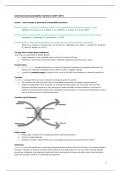Governance and Sustainability Transitions (GEO4-2611)
Lecture 1: main concepts of governance & sustainability transitions
Summary Article 1: Functions of Innovation Systems: A new approach for analysing technological change
- Hekkert, M. P., Suurs, R. A. A., Negro, S. O., Kuhlmann, S., & Smits, R. E. H. M. (2007)
Summary Article 2: Sustainability Transitions Research: Transforming Science and Practice for Societal Change
- Loorbach, D., Frantzeskaki, N., and Avelino, F. (2017)
Summary Article 3: Exploring the governance and politics of transformations towards sustainability
- Patterson, J., Schulz, K. Vervoort, J.M., van der Hel, S.C., Widerberg, O.E., Adler, C., Hurlbert, M., Anderton,
K., Sethi, M. & Barau, Al. (2017)
The gray rhino concept (grijze neushoorns):
Gray rhinos are according to Michele Wucker:
• Large, dangerous, risks, probable events in front of us and in full view
• Reactions to gray rhinos range from denial, muddling, diagnosing, blaming, panic, action
Transformation
• Transformation: fundamental changes in structural, functional, relational, and cognitive dimensions of
linked socio-technical-ecological systems which results in complete change
• It results in complete change in shape or form, such as the shift from feudalism to industrial capitalism
Transition
Transition: a passage from one socio-technical (-ecological) system to another
• For example: the shift from fossil fuels to renewable energy within a capitalist growth economy
• However, depending on how transitions to renewable energy systems are structured, and how they
articulate with other transitions, they may help to catalyse broader societal innovation, new forms of
collective ownership and/or democratic management and reductions in material and energy flows in other
sectors and thus lead to a total transformation
Transition can be disruptive
Politics matter
1. Politics play a critical role in shaping transitions and transformations
2. Politics lie behind policies
3. Questions of power, effectiveness and accountability, democracy and justice become central
Governance
Governance: the interrelated and increasingly integrated system of formal and informal rules, rule-making systems,
and actor-networks at all levels of human society (from local to global) that are set up to steer societies towards
preventing, mitigating, and adapting to global and local environmental change and earth system transformation,
within the normative context of sustainable development
1
,Governance interacts with other spheres
1. The behavioural and technical change that we are striving for, for example meeting the SDG targets
2. Shared beliefs, how we see leadership, and our own role in change and transformation
3. Governance itself transforms (who has agency, access, voice to change things)
Private governance
Private governance: cooperative rule making by business and/or civil society organisations with little or no direct
involvement from governments, governmental agencies or intergovernmental organisations
Systems thinking in transitions
1. Long-term
2. Complexity
3. Uncertainty
Sustainability transitions
Transitions
• Long-term process (1-2 generations, 20-50 years)
• Radical and structural change in culture, structure, practice
• At the level of societal systems
Sustainability transitions
• Radical transformations towards a more sustainable society
• Response to persistent problems in modern societies
Conceptual models to understand transition dynamics
Big questions in sustainability transitions
1. Actors in sustainability transitions (Who?)
2. Geography of transitions (Where?)
3. How do transitions develop over time (When?)
2
,1. Actors in sustainability transitions
Power imbalances
Multi-Actors Perspective
• Multiple institutional logics and actor roles
• Internal inconsistencies
3
, 2. Geography of sustainability transitions
1. Understand whether and why transitions unfold unevenly across space
2. Analyse whether and how context matters for transition processes
3. Analyse how spatial dimensions of local-global networks influence transition processes
4. Analyse the governance of transitions at and across different scales
3. The issue of time in transitions
1. Deep transitions
2. Urgency
3. Political time
Deep transition: a series of connected and
sustained fundamental transformations of a
wide range of socio-technical systems in a
similar direction.
Concluding remarks
1. The deepening urgency of global sustainability and human development challenges in catapulting a focus
on transformative change to the forefront
2. Transitions are deeply political and contested
3. Sustainability transitions have significant implication for equity and social justice along with ecological
concerns
4. Transitions may differ across geographies
5. Transitions may be fluid, shifting and complex phenomena that have no clear beginning or end. This
suggests the need for evaluative tools that are iteratively revised and encompass a systems perspective
4




